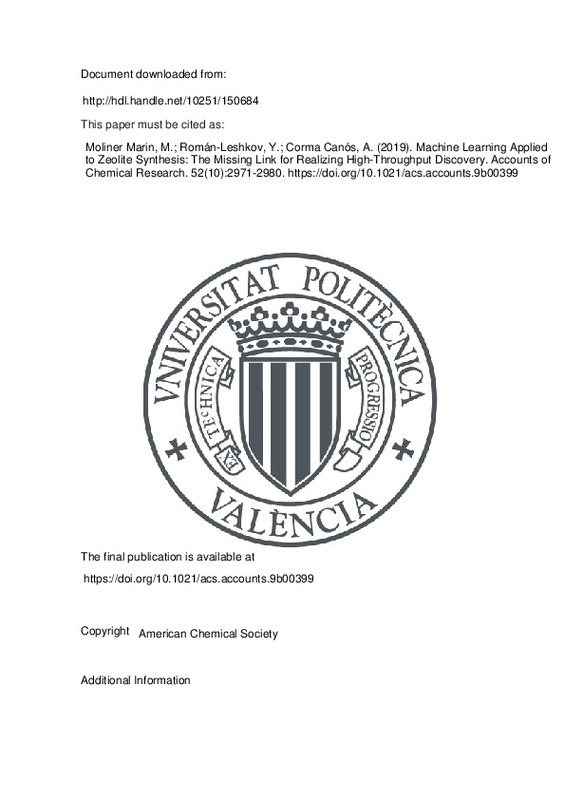JavaScript is disabled for your browser. Some features of this site may not work without it.
Buscar en RiuNet
Listar
Mi cuenta
Estadísticas
Ayuda RiuNet
Admin. UPV
Machine Learning Applied to Zeolite Synthesis: The Missing Link for Realizing High-Throughput Discovery
Mostrar el registro sencillo del ítem
Ficheros en el ítem
| dc.contributor.author | Moliner Marin, Manuel
|
es_ES |
| dc.contributor.author | Román-Leshkov, Yuriy
|
es_ES |
| dc.contributor.author | Corma Canós, Avelino
|
es_ES |
| dc.date.accessioned | 2020-09-24T12:30:45Z | |
| dc.date.available | 2020-09-24T12:30:45Z | |
| dc.date.issued | 2019-10-15 | es_ES |
| dc.identifier.issn | 0001-4842 | es_ES |
| dc.identifier.uri | http://hdl.handle.net/10251/150684 | |
| dc.description.abstract | [EN] CONSPECTUS: Zeolites are microporous crystalline materials with well-defined cavities and pores, which can be prepared under different pore topologies and chemical compositions. Their preparation is typically defined by multiple interconnected variables (e.g., reagent sources, molar ratios, aging treatments, reaction time and temperature, among others), but unfortunately their distinctive influence, particularly on the nucleation and crystallization processes, is still far from being understood. Thus, the discovery and/or optimization of specific zeolites is closely related to the exploration of the parametric space through trial-and-error methods, generally by studying the influence of each parameter individually. In the past decade, machine learning (ML) methods have rapidly evolved to address complex problems involving highly nonlinear or massively combinatorial processes that conventional approaches cannot solve. Considering the vast and interconnected multiparametric space in zeolite synthesis, coupled with our poor understanding of the mechanisms involved in their nucleation and crystallization, the use of ML is especially timely for improving zeolite synthesis. Indeed, the complex space of zeolite synthesis requires draWing inferences from incomplete and imperfect information, for which ML methods are very well-suited to replace the intuition-based approaches traditionally used to guide experimentation. In this Account, we contend that both existing and new ML approaches can provide the "missing link" needed to complete the traditional zeolite synthesis workflow used in our quest to rationalize zeolite synthesis. Within this context, we have made important efforts on developing ML tools in different critical areas, such as (1) data-mining tools to process the large amount of data generated using high-throughput platforms; (2) novel complex algorithms to predict the formation of energetically stable hypothetical zeolites and guide the synthesis of new zeolite structures; (3) new "ab initio" organic structure directing agent predictions to direct the synthesis of hypothetical or known zeolites; (4) an automated tool for nonsupervised data extraction and classification from published research articles. ML has already revolutionized many areas in materials science by enhancing our ability to map intricate behavior to process variables, especially in the absence of well-understood mechanisms. Undoubtedly, ML is a burgeoning field with many future opportunities for further breakthroughs to advance the design of molecular sieves. For this reason, this Account includes an outlook of future research directions based on current challenges and opportunities. We envision this Account will become a hallmark reference for both well-established and new researchers in the field of zeolite synthesis. | es_ES |
| dc.description.sponsorship | This work has been supported by the EU through ERC-AdG2014-671093, by the Spanish Government through SEV-20160683 and RTI2018-101033-B-I00 (MCIU/AEI/FEDER, UE), and by La Caixa-Foundation through MIT -SPAIN MISTI program (LCF/PR/MIT17/11820002). Y.R.-L. thanks the DoE for funding through the Office of Basic Energy Sciences (DE-SC0016214). | es_ES |
| dc.language | Inglés | es_ES |
| dc.publisher | American Chemical Society | es_ES |
| dc.relation.ispartof | Accounts of Chemical Research | es_ES |
| dc.rights | Reserva de todos los derechos | es_ES |
| dc.subject | Structure-Directing agents | es_ES |
| dc.subject | Artificial neural-networks | es_ES |
| dc.subject | X-Ray-Diffraction | es_ES |
| dc.subject | Hydrothermal synthesis | es_ES |
| dc.subject | Molecular-Sieve | es_ES |
| dc.subject | Combinatorial | es_ES |
| dc.subject | Design | es_ES |
| dc.subject | Methodology | es_ES |
| dc.subject | Prediction | es_ES |
| dc.subject | Frameworks | es_ES |
| dc.subject.classification | QUIMICA ORGANICA | es_ES |
| dc.title | Machine Learning Applied to Zeolite Synthesis: The Missing Link for Realizing High-Throughput Discovery | es_ES |
| dc.type | Artículo | es_ES |
| dc.identifier.doi | 10.1021/acs.accounts.9b00399 | es_ES |
| dc.relation.projectID | info:eu-repo/grantAgreement/EC/H2020/671093/EU/MATching zeolite SYNthesis with CATalytic activity/ | es_ES |
| dc.relation.projectID | info:eu-repo/grantAgreement/Fundació Bancària Caixa d'Estalvis i Pensions de Barcelona//LCF%2FPR%2FMIT17%2F11820002/ | es_ES |
| dc.relation.projectID | info:eu-repo/grantAgreement/DOE//DE-SC0016214/ | es_ES |
| dc.relation.projectID | info:eu-repo/grantAgreement/AEI/Plan Estatal de Investigación Científica y Técnica y de Innovación 2017-2020/RTI2018-101033-B-I00/ES/DISEÑO DE CATALIZADORES MULTIFUNCIONALES PARA LA CONVERSION EFICIENTE DE BIOGAS Y GAS NATURAL A HIDROCARBUROS DE INTERES INDUSTRIAL/ | es_ES |
| dc.relation.projectID | info:eu-repo/grantAgreement/MINECO//SEV-2016-0683/ | es_ES |
| dc.rights.accessRights | Abierto | es_ES |
| dc.contributor.affiliation | Universitat Politècnica de València. Instituto Universitario Mixto de Tecnología Química - Institut Universitari Mixt de Tecnologia Química | es_ES |
| dc.contributor.affiliation | Universitat Politècnica de València. Departamento de Química - Departament de Química | es_ES |
| dc.description.bibliographicCitation | Moliner Marin, M.; Román-Leshkov, Y.; Corma Canós, A. (2019). Machine Learning Applied to Zeolite Synthesis: The Missing Link for Realizing High-Throughput Discovery. Accounts of Chemical Research. 52(10):2971-2980. https://doi.org/10.1021/acs.accounts.9b00399 | es_ES |
| dc.description.accrualMethod | S | es_ES |
| dc.relation.publisherversion | https://doi.org/10.1021/acs.accounts.9b00399 | es_ES |
| dc.description.upvformatpinicio | 2971 | es_ES |
| dc.description.upvformatpfin | 2980 | es_ES |
| dc.type.version | info:eu-repo/semantics/publishedVersion | es_ES |
| dc.description.volume | 52 | es_ES |
| dc.description.issue | 10 | es_ES |
| dc.identifier.pmid | 31553162 | es_ES |
| dc.relation.pasarela | S\406602 | es_ES |
| dc.contributor.funder | U.S. Department of Energy | es_ES |
| dc.contributor.funder | European Regional Development Fund | es_ES |
| dc.contributor.funder | Ministerio de Economía y Competitividad | es_ES |
| dc.contributor.funder | Fundació Bancària Caixa d'Estalvis i Pensions de Barcelona | es_ES |
| dc.contributor.funder | Agencia Estatal de Investigación | es_ES |







![[Cerrado]](/themes/UPV/images/candado.png)

